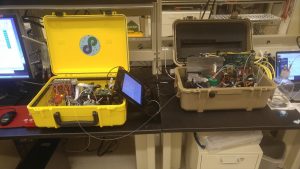Suitcase-sized microbial detection device to begin field-testing in spring

SCCWRP this spring will begin field-testing a suitcase-sized prototype instrument that could revolutionize the speed at which beach ocean water is analyzed for microbial contamination.
The droplet digital PCR (polymerase chain reaction) instrument, developed by researchers at Arizona State University (ASU) and the Monterey Bay Aquarium Research Institute (MBARI) in collaboration with SCCWRP, consists of a ddPCR machine paired to a system that can accept raw water samples. The system, which can provide ddPCR results in about two hours, is intended to be so simple to use that it could be operated by a lifeguard.
Unlike traditional methods that require water samples to be brought to a lab for analysis – a process that can take up to 24 hours – the microbial contamination detection device will be field-deployable, producing results within two hours.
MBARI and ASU are continuing to refine the design of the prototype instrument before delivering it to SCCWRP for field testing, scheduled to begin as early as March.
More news related to: Microbial Source Tracking, Microbial Water Quality